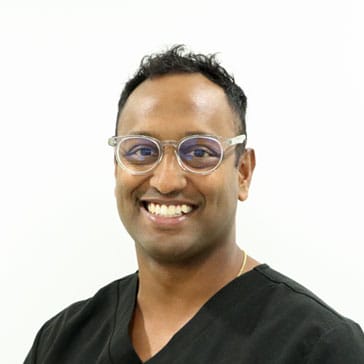Implants vs Dentures
Mention the word denture and you might have a flashback to your grandad’s favourite party trick – popping out his row of false teeth to make an audience of kids laugh. Dental prosthetics have come a long way since then, and today there are numerous options to suit individual needs and requirements.
Dr Dharsh Sritharan, Dentist at St John Dental says the first and most important step in considering dentures or implants is to examine whether existing teeth can be retained.
“There’s no better substitute for someone’s natural tooth than their own tooth, so all avenues should be explored in retaining natural teeth before the decision is made to extract.”
When natural teeth can’t be retained: what are the options?
Complete Denture
A complete denture may be required if all teeth need to be replaced. A row of replacement teeth is attached to a pink acrylic base resembling the gum. This is fitted over the gum and can be removed.
+Pros
|
-Cons
|
Partial Denture
Partial dentures are also removable and can be used when one or more natural teeth remain in the jaw. Like a complete denture, a removable partial denture has replacement teeth attached to a ‘gum-coloured’ acrylic base. A metal or acrylic framework often holds the denture in place in the mouth.
+Pros
|
-Cons
|
Bridges
A fixed “bridge” replaces one or more teeth by placing crowns on the remaining natural teeth next to the missing teeth (called abutments), and attaching the new artificial teeth (pontics) to the crowns, filling the gap.
+Pros
|
-Cons
|
Dental Implants
Dental implants involve the surgical insertion of titanium fixtures into the jaw in place of missing teeth. These fixtures will then act as an anchor point for permanent replacement teeth, a bridge or even a denture.
+Pros
|
-Cons
|
Implant and denture combination
A combination of implants and dentures may be used where a patient is experiencing difficulty with retention – that is, keeping the denture in the mouth. This is often experienced by those with complete dentures, and particularly lower dentures.
+Pros
|
-Cons
|
 What’s right for me?
What’s right for me?
Following an initial assessment, your dentist will conduct a thorough examination to determine the best course of treatment based on the patient’s circumstances. Factors which may influence or determine whether dentures, implants, or a combination of both would be best suited for a patient include:
- Patient’s age
- Condition of existing teeth, gums and underlying bone
- Number and position of teeth requiring replacement
- Affordability
- Risk associated with surgery
- The patient’s overall health
- Habits such as smoking
- Patient preference and requirements
- Cosmetic and functional requirements
If you’ve had concerns about missing or vulnerable teeth and would like to know more about your options, St John Dental can help with expertise on both replacement teeth and preventative dental.
You can book an appointment with Dr Dharsh Sritharan, quoted in this article, at our Cockburn St John Dental clinic.

 What’s right for me?
What’s right for me?